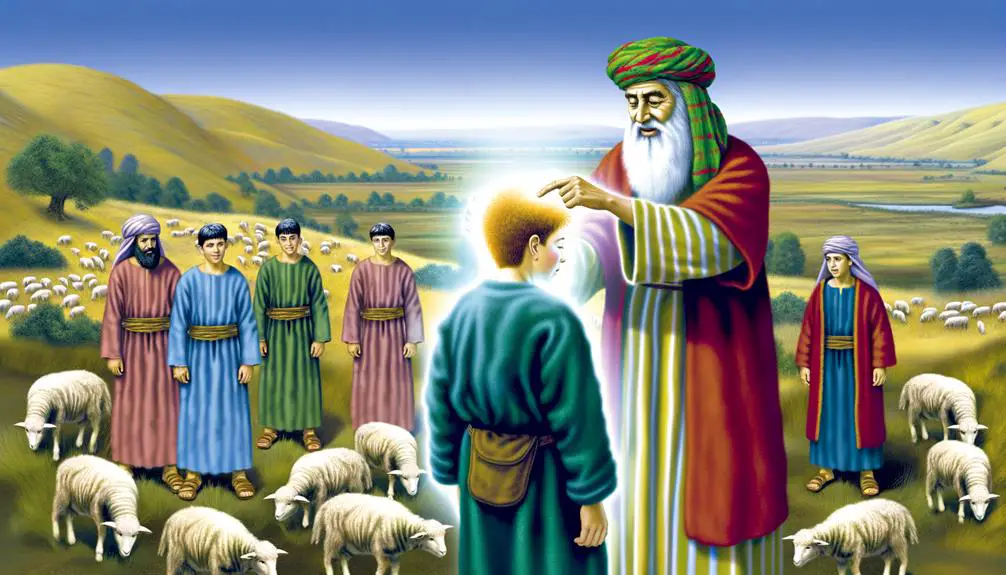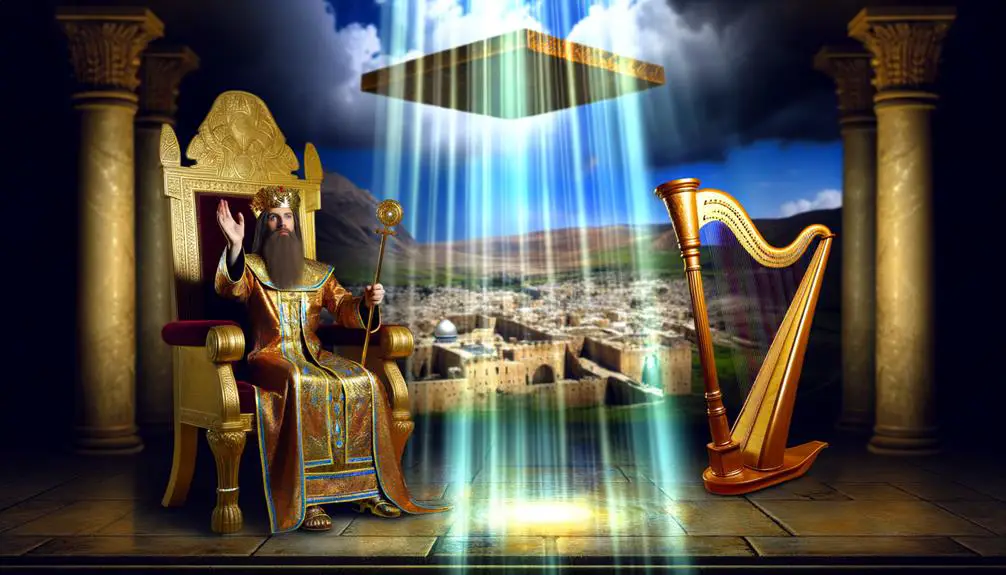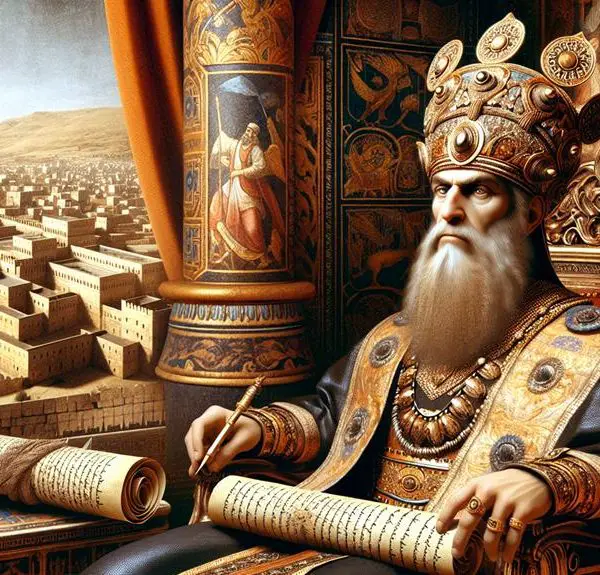Highlighting King David's biblical journey, this exploration reveals a tapestry of triumph, trial, and timeless lessons in leadership and faith.

King David Pictures in the Bible
Diving deep into the depictions of King David in the Bible, you'll find a fascinating blend of bravery, beauty, and belief. From his days as a shepherd boy to his anointment and his monumental battle with Goliath, each story paints a picture of a man after God's own heart.
Yet, beyond these well-known tales lies a complex character whose life was filled with both triumphs and trials. As you explore his reign and his profound contributions as a psalmist, you're left to ponder: what can David's legacy teach us about leadership, faith, and resilience in the face of adversity?
Key Takeaways
- King David's deep spirituality and legacy are vividly captured in the Psalms, offering a rich pictorial insight into his character.
- His life's pivotal events, from shepherd boy to king, are depicted through biblical narratives, painting a picture of his journey.
- David's artistic legacy, notably his psalmistry, influences religious art, providing visual representations of his spiritual and musical contributions.
- The strategic establishment of Jerusalem as a capital is a key moment, often illustrated to highlight David's significant role in biblical history.
David the Shepherd Boy

Before becoming the renowned king, David's early life as a shepherd boy laid the foundation for his character and destiny. This phase of his existence wasn't just a prelude but a significant period that honed skills and virtues critical to his future roles. Shepherd's life, inherently demanding and solitary, taught David resilience, responsibility, and the importance of vigilant care for those under his watch.
Flock care, central to a shepherd's duties, involves more than just leading the sheep to pastures. It encompasses protection, guidance, and an understanding of the needs of each animal. David's adeptness in this role is indicative of his innate leadership qualities and his ability to empathize and connect with those he leads. This early experience in nurturing and defending his flock against predators likely imbued him with the courage and tactical acumen that later defined his military and kingship exploits.
Moreover, the shepherd's life is one of profound connection with nature, offering ample time for reflection, prayer, and the development of a deep spiritual life. This aspect of David's life is crucial, as it laid the spiritual groundwork for his poetic expressions in Psalms and his unwavering faith in God.
In essence, David's tenure as a shepherd boy wasn't merely an occupation but a divinely orchestrated training ground. It prepared him for the complexities of leadership, warfare, and governance, ensuring that when the time came, he wasn't just ready but destined to lead.
The Anointing of David

Reflecting on David's formative years as a shepherd boy, it's evident that his spiritual maturity and leadership qualities set the stage for a pivotal moment in biblical history: his anointing by the prophet Samuel. This event isn't just a simple ceremony; it's a turning point that underscores the divine selection process and the importance of character over appearance.
Samuel's journey to David encapsulates a profound lesson in divine guidance and the unexpected nature of God's choices. Here are four critical aspects of this event:
- Divine Instruction: Samuel is directed by God to visit Bethlehem and anoint one of Jesse's sons as the next king of Israel. This instruction signifies the beginning of a new era.
- Jesse's Sons: As Samuel meets Jesse's sons, each one passes before Samuel, but none are chosen. This procession highlights the anticipation and the process of discernment that Samuel undergoes, relying on God's guidance rather than his judgment.
- David's Unexpected Choice: Despite being the youngest and tending to the sheep, David is chosen. His selection illustrates the theme that God's criteria for leadership often defy human expectations and societal norms.
- The Anointing: The act of anointing David among his brothers signifies his divine selection as king. It's a symbolic moment that marks the empowerment and consecration of David for his future role.
Through these elements, it's clear that the anointing of David isn't merely a ritual but a profound demonstration of divine preference and purpose, setting the stage for his remarkable journey as a leader of Israel.
David and Goliath

Transitioning from his anointing, David's encounter with Goliath exemplifies his courage and faith, marking a defining moment in his ascent to leadership. This story is not just a tale of victory against all odds, but also an insightful exploration of the Giant's perspective and the intricate Armor detail that played a pivotal role in the narrative.
Aspect |
David |
Goliath |
|---|---|---|
Perspective |
Faith-driven, viewing Goliath as defeatable |
Confident in physical superiority, disdain |
Strategy |
Used a sling; relied on speed and precision |
Expected a traditional combat encounter |
Armor |
Minimal, carried only his sling and stones |
Extensively armored, symbolizing strength |
Outcome |
Triumph through ingenuity and faith |
Defeat, underestimating his opponent |
Analyzing the Giant's perspective, it's clear that Goliath underestimated David, a mistake stemming from his confidence in his physical prowess and the imposing nature of his armor. The detail of Goliath's armor, described meticulously in the Bible, highlights not just his readiness for battle but also the era's emphasis on warfare and protection. It symbolized invincibility, contrasting sharply with David's minimalistic approach.
David's strategy, focusing on agility and precision, not only demonstrates his tactical acumen but also his deep faith. He didn't see Goliath as an unbeatable giant but as a challenge that could be overcome with God's help. This encounter, rich in symbolism and lessons, sets the stage for David's future as a leader who combines faith, strategy, and humility.
King David's Reign

As you explore King David's reign, you'll uncover the strategic military conquests that solidified his power.
You'll see how he established Jerusalem as the political and spiritual capital, shaping the identity of a nation.
Moreover, David's Psalms reveal the depth of his spirituality, leaving a legacy that resonates through biblical history.
David's Military Conquests
King David's reign was marked by a series of strategic military conquests that significantly expanded the boundaries of Israel. His understanding of battle strategies and handling of Philistine conflicts were key to his success.
- Utilization of Spies: David often used spies for gathering crucial information about enemy plans and positions.
- Guerrilla Warfare Tactics: He employed guerrilla tactics, striking quickly and unexpectedly, which confused and demoralized his adversaries.
- Diplomatic Alliances: David formed alliances with neighboring states, securing his kingdom's borders and ensuring mutual protection against common enemies.
- Training of the Mighty Men: He also focused on the rigorous training of his elite warriors, known as the 'Mighty Men', enhancing the effectiveness of his military campaigns.
These strategies collectively enabled David to achieve remarkable victories and solidify Israel's position in the region.
Jerusalem: Capital Establishment
Building on his military triumphs, David then set a monumental milestone by establishing Jerusalem as the capital of Israel during his reign. This strategic move wasn't merely a political statement; it was a masterstroke in city planning and architectural development, aimed at uniting the twelve tribes under a single, centralized authority.
David's vision for Jerusalem went beyond its immediate military and political advantages. He embarked on extensive city planning, laying the groundwork for its transformation into a bustling metropolis. His efforts in architectural development were equally significant, with the construction of his palace marking the beginning of Jerusalem's rise as a cultural and religious center.
Through these initiatives, David not only solidified his rule but also laid the foundations for Jerusalem's enduring significance in the history of Israel.
Psalms: David's Spiritual Legacy
David's reign also marked a profound spiritual contribution through the composition of Psalms, cementing his legacy as a pivotal religious figure in Israel's history. These texts aren't just religious hymns but deep expressions of spiritual introspection and ethical dilemmas.
Here's how David's Psalms contribute to our understanding of his spiritual legacy:
- Spiritual Introspection: They offer a window into David's soul, revealing his deep faith and profound relationship with God.
- Ethical Dilemmas: Many Psalms reflect David's struggles with moral choices, showcasing his humanity and quest for righteousness.
- Praise and Worship: His Psalms set a precedent for Jewish and Christian worship, emphasizing the importance of a heartfelt relationship with the divine.
- Historical Insight: They provide unique perspectives on the spiritual and socio-political climate of ancient Israel.
David the Psalmist

As you explore King David's multifaceted role in biblical history, his identity as the Psalmist emerges as a compelling aspect of his legacy. His contribution to the Psalms not only showcases his profound spiritual depth but also highlights his central role in the development of worship practices.
Analyzing his musical legacy and the Psalms of Worship reveals the enduring impact of his artistic and spiritual expressions.
David's Musical Legacy
Beyond his role as a warrior and king, David's contribution to music, particularly through his Psalms, showcases a profound legacy that continues to influence religious and cultural practices today. His involvement with musical instruments and the creation of ancient compositions set a foundation for spiritual music.
- Musical Instruments: David skillfully played the lyre, incorporating it into religious ceremonies, thus elevating its status in sacred music.
- Ancient Compositions: His Psalms are some of the earliest recorded songs, deeply rooted in the worship and traditions of ancient Israel.
- Emotional Expression: David's Psalms cover a wide emotional spectrum, from despair to joy, reflecting human experiences through music.
- Influence on Music Theory: His work contributes to the early development of music theory, showcasing structure and harmony in ancient compositions.
Psalms of Worship
Exploring further into his musical contributions, we find that David's Psalms of Worship stand as a testament to his profound spiritual and artistic influence on religious music. These psalms, often infused with the use of musical instruments, showcase a deep understanding and appreciation for the power of music in worship practices.
David's mastery in combining lyrical poetry with the resonant sounds of harps, lyres, and cymbals not only enriched the ceremonial aspects of worship but also deeply affected the emotional and spiritual experiences of the worshippers. His innovative approach in integrating music with worship practices has left a lasting legacy, influencing religious music and ceremonies across generations.
David's Psalms of Worship embody a blend of artistic creativity and spiritual fervor, setting a benchmark for worship music.
The Legacy of David

David's legacy, deeply rooted in both religious and cultural narratives, significantly shapes our understanding of biblical history. His reign is marked by both his devout faith and his human flaws, which have been subjects of analysis and reflection for centuries. David's adultery and the complex narrative surrounding Solomon's succession highlight his multifaceted character. Despite his failings, David's impact is undeniably profound.
Here are four key aspects of David's legacy:
- Foundation of Jerusalem: David established Jerusalem as the political and spiritual center of Israel, a decision that has influenced Jewish, Christian, and Islamic traditions to this day.
- Psalms: Traditionally attributed to David, the Psalms remain central to worship in Judaism and Christianity, reflecting the depth of human emotion and the complexity of seeking a relationship with the divine.
- Davidic Covenant: The promise made to David regarding the eternal dynasty of his lineage not only set the foundation for the future expectation of a Messiah in Judaism but also influenced Christian interpretations of Jesus' significance.
- Artistic and Cultural Influence: David's life story has inspired countless works of art, literature, and music, making him one of the most iconic figures in Western culture. His struggles and triumphs resonate with themes of power, redemption, and faith.
David's legacy is a testament to the complexity of human nature and the enduring quest for spiritual meaning. He remains a pivotal figure whose life continues to inspire and challenge people across the world.
Frequently Asked Questions
How Have Depictions of King David Evolved in Art and Literature Outside of the Bible Through Different Historical Periods?
You've noticed how depictions of King David have changed over time, haven't you?
From Renaissance interpretations, which highlighted his divine kingship and strength, to modern media adaptations that often focus on his flaws and humanity, the portrayal of this biblical figure has evolved significantly.
This shift reflects changing societal values and artistic norms, illustrating how historical and cultural contexts deeply influence how historical figures are represented in art and literature.
What Are Some of the Archaeological Findings That Might Support or Contradict the Biblical Accounts of King David's Life and Reign?
You're delving into the past, unearthing history, seeking truths. Archaeological discoveries, like the Tel Dan Stele, shed light on the Davidic Dynasty's existence, offering support to biblical narratives.
However, evidence for specific events, such as the Goliath encounter, remains elusive. These findings form a complex puzzle, where pieces both support and challenge the biblical accounts of King David's reign, urging a nuanced, objective analysis of history and scripture.
How Do Different Religious Traditions Interpret King David's Moral and Ethical Decisions, Particularly in the Context of His More Controversial Actions?
You're delving into how various religious traditions view King David's moral and ethical decisions, especially when examining his controversial actions.
These traditions often focus on David's repentance and leadership style as key indicators of his character. They analyze his actions and the aftermath, considering whether his repentance was sincere and how his leadership influenced his choices and their consequences.
This analysis offers a multifaceted view of a complex historical and religious figure.
In What Ways Has King David's Image Been Utilized in Political and National Symbolism, Particularly in the Modern State of Israel?
You're exploring how King David's image is used in political and national symbolism in modern Israel.
The Davidic dynasty represents continuity and legitimacy, connecting current leadership to historical roots.
Goliath imagery evokes the idea of overcoming great challenges, akin to Israel's narrative against larger adversaries.
This use of symbolism deepens national identity and unity, illustrating the power of historical figures to influence contemporary political and cultural landscapes.
How Have King David's Musical Contributions, Traditionally Attributed to Him in the Form of Psalms, Influenced the Development of Religious Music in Judaism and Christianity?
You're exploring how King David's Psalms have shaped religious music in both Judaism and Christianity. Through musical notation and instrument evolution, these ancient texts have deeply influenced hymns, chants, and liturgical music across centuries.
David's role as a musician and poet has fostered a rich tradition of worship music, embedding his artistic legacy within the fabric of these faiths. This cross-cultural impact highlights his enduring influence on spiritual expression.
Conclusion
In sum, King David's multifaceted legacy, from shepherd boy to revered king, is captured vividly in biblical narratives and Psalms.
Interestingly, over 1000 songs and poems are attributed to him, showcasing his profound impact on religious and cultural literature.
This staggering number not only highlights his skill as a poet and musician but also underscores his enduring influence on religious thought and artistic expression.
Analyzing David's life through these works provides a deeper understanding of his complex character and the values he embodied.



Sign up